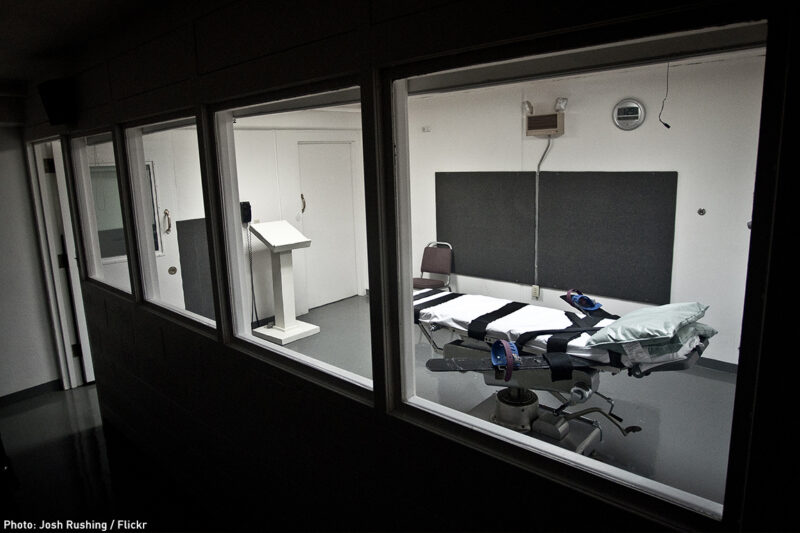Arkansas’s Reckless Plan to Execute 8 Men in 10 Days Could End in State-Sanctioned Torture Before Death


Between April 17 and 27, Arkansas Gov. Asa Hutchinson plans on doing what should be inconceivable: executing eight prisoners in ten days.
After killing no prisoners in the last 12 years, the state is rushing to execute these eight men before the controversial execution drug it needs to carry them out expires on April 30. The drug, midazolam, has been directly linked to past botched executions, but that hasn’t stopped Hutchinson from planning a killing spree in a few weeks. By racing to use a drug known to play a part in botched executions, the governor risks debasing the state of Arkansas, its citizens, and the very American traditions of justice by torturing prisoners to death.
In a hospital setting, midazolam is prescribed by doctors to calm patients’ nerves or act as a sedative for minor procedures. It is not used to put patients under for surgery, let alone anesthetize prisoners before killing them. And when midazolam is combined with the two other drugs used during the execution — vecuronium bromide and potassium chloride — it produces unspeakable pain before death.
We know this because it’s happened before.
The most recent midazolam botch occurred during Alabama’s December execution of Ronald Bert Smith. His execution took 34 minutes, during which time Smith heaved and coughed for 13 minutes. His attorneys reported that he remained conscious, responding to corrections officials, well into the execution.
In 2014, the state of Ohio relied on midazolam with the same horrific results. That same year, a similar nightmare transpired over the course of two long hours after Arizona used 15 repeated doses to execute Joseph Wood before he finally stopped coughing and, gulping once, died. These botches together have led an Ohio judge to halt future executions using midazolam, while Florida and Arizona have also abandoned it.
Beyond the cruelty of using a defective drug to kill someone, Arkansas is upping the probability of something going terribly wrong by ratcheting up the pace of its executions. Double and triple executions are rare in the history of the U.S. death penalty and haven’t occurred in close to 20 years. When they did happen, it was in a bygone era when states were annually executing three and four times as many people as they do today. Even then, no state attempted, as Arkansas plans for this April, four double executions in ten days.
The last state to attempt a double execution was Oklahoma, when, also using midazolam, it botched the execution of Clayton Lockett. The prison warden himself called it a “bloody mess.” The scene in Lockett’s execution chamber was chaos. A doctor was squirted with Lockett’s blood as it spurted from a vein. The personnel were confused and distressed. Lockett did not die until 43 minutes later, after the execution had been halted and the shades drawn on the adjacent viewing room. Meanwhile, Charles Warner waited to die in the state’s second planned execution of the night. After the botch of Lockett’s execution, Warner’s was cancelled, and the state announced that it would no longer schedule more than one execution in a seven-day period.
Multiple dates, set so closely together, increase the risk of human error and resulting torture and injustice. Arkansas’s previous botched executions — of Ricky Ray Rector in 1992 and Christina Marie Riggs in 2000, like Lockett’s botch — each involved failure to place execution lines properly in the veins. This history highlights the role in executions of fallible human beings, who can’t help but be affected by the pace and horror of multiple executions. As Sen. John McCain said of Joseph Wood’s botched midazolam execution, "The lethal injection needs to be an indeed lethal injection and not the bollocks-upped situation that just prevailed. That's torture.”
History risks repeating itself when we don’t heed its lessons. We don’t need another state-sanctioned killing to be botched by the use of midazolam or by the reckless clip of Gov. Hutchinson’s scheduled killings. Assembly line justice — artificially paced to an expiring controversial drug choice — can only end in easily avoidable disaster.
Stay informed
Sign up to be the first to hear about how to take action.
By completing this form, I agree to receive occasional emails per the terms of the ACLU's privacy statement.
By completing this form, I agree to receive occasional emails per the terms of the ACLU's privacy statement.

